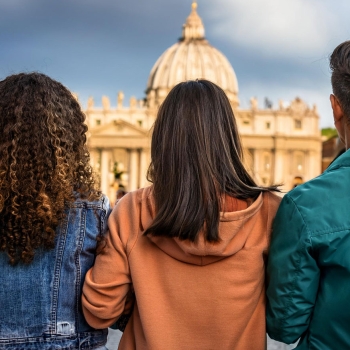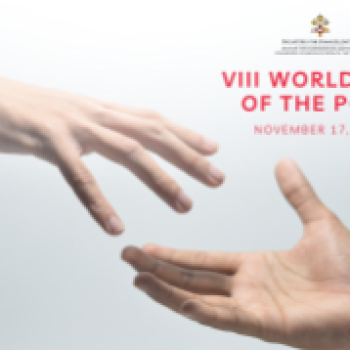Dear brothers and sisters,
1. The prayer of the poor rises up to God (cf. Sir 21:5). In this year dedicated to prayer in anticipation of the Ordinary Jubilee of 2025, this expression of biblical wisdom is most fitting as we prepare for the Eighth World Day of the Poor, which will be observed on 17 November. Indeed, Christian hope embraces the certainty that our prayer reaches God’s presence; not just any prayer but rather the prayer of the poor! Let us reflect on this word and “read” it on the faces and in the stories of the poor whom we encounter daily, so that prayer can become a path of communion with them and a sharing in their suffering.
2. The Book of Sirach, of which we are speaking, is not sufficiently known, yet it deserves to be discovered for the richness of its themes, especially regarding the relationship of humanity with God and with the world. Its author, Ben Sira, was a teacher, a scribe in Jerusalem, likely writing in the 2nd century B.C. He was a wise man, deeply rooted in Israel’s tradition, who taught on various aspects of human life: work, family, social life and the education of the young. He paid special attention to themes related to faith in God and observance of the Law. He tackled the difficult issues of freedom, evil and divine justice, which are still highly relevant to us today. Inspired by the Holy Spirit, Ben Sira sought to point out to everyone the path to follow in order to live a wise and dignified life in the eyes of God and our brothers and sisters.
3. One of the themes to which this sacred author devotes significant attention is prayer. He does so with great fervour because he gives voice to his personal experience. Indeed, no writing on prayer can be effective and fruitful if it does not stem from someone who stands daily in God’s presence and listens to his Word. Ben Sira declares that he sought wisdom from his youth: “While I was still young, before I went on my travels, I sought wisdom openly in my prayer” (Sir 51:13).
4. On this journey, he discovered one of the fundamental truths of revelation, namely, that the poor hold a privileged place in God’s heart, to the point that, in the face of their suffering, God is “impatient” until he has rendered justice to them. “The prayer of the humble pierces the clouds, and he will not be consoled until it reaches the Lord; he will not desist until the Most High visits him, and does justice for the righteous, and executes judgment. And the Lord will not delay” (Sir 35:17-18). God knows the sufferings of his children because he is an attentive and caring father. As a father, he takes care of those who are most in need: the poor, the marginalized, the suffering and the forgotten. No one is excluded from his heart, for in his eyes, we are all poor and needy. We are all beggars because, without God, we would be nothing. We would not even have life if God had not given it to us. Yet how often we live as if we were the masters of life or as if we had to conquer it! The mentality of the world demands that we become somebody, that we make a name for ourselves at any cost, breaking social norms in order to accumulate wealth. How sad of an illusion this is! Happiness cannot be acquired by trampling on the rights and dignity of others.
The violence caused by wars clearly shows the arrogance of those who consider themselves to be powerful before men and women, but they are poor in the eyes of God. How many more people are impoverished by misguided policies involving weapons! How many innocent victims! Yet we cannot turn our backs to this reality. The disciples of the Lord know that each of these “little ones” bears the image of the Son of God and each one must receive our support and expressions of Christian charity. “Each individual Christian and every community is called to be an instrument of God for the liberation and promotion of the poor, and for enabling them to be fully a part of society. This demands that we be docile and attentive to the cry of the poor and to come to their aid” (Evangelii Gaudium, 187).
5. In this year dedicated to prayer, we need to make the prayer of the poor our own and pray together with them. This is a challenge we must embrace and a pastoral activity that needs to be nurtured. Moreover, “the worst discrimination which the poor suffer is the lack of spiritual care. The great majority of the poor have a special openness to the faith; they need God and we must not fail to offer them his friendship, his blessing, his word, the celebration of the sacraments and a journey of growth and maturity in the faith. Our preferential option for the poor must mainly translate into a privileged and preferential religious care” (ibid., 200).
All of this requires a humble heart, one that has the courage to become a beggar. A heart that is ready to acknowledge itself as poor and needy. Indeed, there is a correlation between poverty, humility and trust. The truly poor person is the humble one, as the holy Bishop Augustine said: “The poor have nothing to be proud of, the rich must combat their pride. Therefore, listen to me: be truly poor, be virtuous, be humble” (Sermons, 14, 4). The humble have nothing to boast of and nothing to claim; they know they cannot rely on themselves but firmly believe they can appeal to God’s merciful love, standing before him like the prodigal son who returns home repentant to receive the father’s embrace (cf. Lk 15:11-24). The poor, having nothing to rely on, receive strength from God and place all their trust in him. Indeed, humility generates trust that God will never abandon us and will never leave us without a response.
6. To the poor who dwell in our cities and are part of our communities, I say: do not lose this certainty! God is attentive to each of you and is close to you. He does not forget you nor could he ever do so. We all have had the experience of prayers that seem to remain unanswered. Sometimes we ask to be freed from a misery that makes us suffer and humiliates us, and God seems not to hear our cry. However, God’s silence does not mean he is inattentive to our sufferings; rather, it contains a word that must be received with trust, surrendering ourselves to him and to his will. Sirach again attests to this: the Lord’s judgment will be in favour of the poor (cf. Sir 21:5). From poverty, therefore, the song of the most genuine hope can spring up. Let us remember that “whenever our interior life becomes caught up in its own interests and concerns, there is no longer room for others, no place for the poor. God’s voice is no longer heard, the quiet joy of his love is no longer felt, and the desire to do good fades” (Evangelii Gaudium, 2).
7. The World Day of the Poor has now become a fixture for every ecclesial community. It is a pastoral opportunity not to be underestimated, for it challenges every believer to listen to the prayer of the poor, becoming aware of their presence and needs. It is an opportune occasion to implement initiatives that concretely help the poor and to recognize and support the many
volunteers who dedicate themselves passionately to those most in need. We must thank the Lord for the people who make themselves available to listen to and support the poorest among us. They are priests, consecrated persons, lay men and women who, by their testimony, give voice to God’s response to the prayer of those who turn to him. This silence, therefore, is broken every time a person in need is welcomed and embraced. The poor still have much to teach us because in a culture that has placed wealth at the forefront and often sacrifices the dignity of people on the altar of material goods, they swim against the tide, highlighting that what is essential for life is something else entirely.
Prayer, then, is verified by authentic charity that manifests itself as encounter and proximity. If prayer does not translate into concrete action, it is in vain; indeed, “faith by itself, if it has no works, is dead” (Jas 2:17). However, charity without prayer risks becoming philanthropy that soon exhausts itself. “Without daily prayer lived with fidelity, our acts are empty, they lose their profound soul, and are reduced to being mere activism” (BENEDICT XVI, Catechesis, April 25, 2012). We must avoid this temptation and always be vigilant with the strength and perseverance that comes from the Holy Spirit, who is the giver of life.
8. In this context, it is beautiful to recall the testimony left to us by Mother Teresa of Calcutta, a woman who gave her life for the poor. Saint Teresa continually repeated that it was from prayer that she drew the strength and faith for her mission of service to the least among us. When she spoke at the General Assembly of the UN on October 26, 1985, showing everyone the rosary she always held in her hand, she said: “I am only a poor sister who prays. By praying, Jesus puts his love in my heart, and I go to give it to all the poor I meet along the way. Pray too! Pray, and you will notice the poor who are beside you. Perhaps on the same floor in your apartment building. Perhaps even in your houses, someone is waiting for your love. Pray, and your eyes will open, and your heart will fill with love”.
How can we not recall here in the city of Rome, Saint Benedict Joseph Labre (1748-1783), whose body rests and is venerated in the parish church of Santa Maria ai Monti. A pilgrim from France to Rome, rejected by many monasteries, he spent the last years of his life poor among the poor, spending hours in prayer before the Blessed Sacrament, with the rosary, reciting the breviary, reading the New Testament and the Imitation of Christ. Having no place to stay, he usually slept in a corner of the ruins of the Colosseum like a “vagabond of God,” making his life a ceaseless prayer that rose up to God.
9. As we journey towards the Holy Year, I urge everyone to become pilgrims of hope, setting tangible goals for a better future. Let us not forget to keep “the little details of love” (Gaudete et Exsultate, 145): stopping, drawing near, giving a little attention, a smile, a caress, a word of comfort. These gestures are not automatic; they require a daily commitment and are often hidden and silent, but strengthened by prayer. In this time, when the song of hope seems to give way to the clamour of arms, to the cry of many innocent wounded, and the silence of the countless victims of wars, we turn to God with our plea for peace. We stretch out our hands to receive peace as a precious gift for we are “poor” in this regard, while at the same time committing ourselves to weave it back into daily life.
10. We are called in every circumstance to be friends of the poor, following in the footsteps of Jesus who always began by showing solidarity when dealing with the least among us. May the Mother of God, Mary Most Holy, who appeared at Banneux and left a message not
to be forgotten: “I am the Virgin of the poor,” sustain us on this journey. To Mary, whom God has looked upon with favour for her humble poverty, accomplishing great things through her obedience, we entrust our prayers, convinced that they will rise to heaven and be heard».
Rome, Saint John Lateran, 13 June 2024, Memorial of Saint Anthony of Padua, Patron of the Poor
FRANCIS

_small.jpg)



_small.gif)
